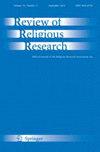When God Calls: Temporality in Southern Baptist Calls to Missions
IF 1.7
1区 哲学
0 RELIGION
引用次数: 0
Abstract
Researchers studying religious experience have identified callings as a particularly salient context in which believers describe God’s presence. They have noted standard elements that make up call narratives, along with variation in how recipients articulate both the vertical call, God’s intervention in the believer’s life, and the horizontal call, the community’s response. However, how these standard elements are combined to produce culturally resonant narratives remains underexplored. Drawing on semi-structured interviews with Southern Baptist missionaries, the paper describes how arbiters evaluate calls. In (de)legitimating prospective missionaries’ vocational claims, local pastors and administrative staff prospectively anticipate missionaries’ success and tether the call to missionaries’ prior experience. Turning to how missionaries construct call narratives, I identify two distinct modes of narrating one’s calling. I further argue that call narratives’ temporal organization offers a lens through which to explain variation in how missionaries characterize both the horizontal and vertical call. Missionaries marshal their experiences of God’s intervention and of social influence either to accentuate the connectedness of their call to previous experience or to articulate a disjuncture. The findings extend previous research on religious experience by suggesting that temporal claims-making is a key strategy for actors to legitimate private or otherwise unverifiable experience.当神呼召:美南浸信会宣教呼召中的时间性
研究宗教体验的研究人员发现,呼召是信徒描述上帝存在的一个特别突出的背景。他们注意到构成呼召叙述的标准元素,以及接受者如何表达纵向呼召(神对信徒生活的干预)和横向呼召(社区的回应)的变化。然而,如何将这些标准元素结合起来以产生文化共鸣的叙事仍未得到充分探索。根据对美南浸信会传教士的半结构化采访,论文描述了仲裁者如何评估电话。为了使未来传教士的职业主张合法化,当地牧师和行政人员预期传教士的成功,并将呼召与传教士先前的经验联系起来。谈到传教士如何构建呼召叙事,我确定了两种截然不同的模式来叙述一个人的呼召。我进一步认为呼召叙事的时间组织提供了一个透镜,通过它可以解释传教士如何描述水平呼召和垂直呼召的变化。传教士将他们对上帝的干预和社会影响的经历整理起来,要么强调他们与先前经历的联系,要么阐明一个脱节。这些发现扩展了之前对宗教经验的研究,表明时间上的主张是行为者将私人或其他无法证实的经验合法化的关键策略。
本文章由计算机程序翻译,如有差异,请以英文原文为准。
求助全文
约1分钟内获得全文
求助全文
来源期刊

Review of Religious Research
Multiple-
CiteScore
2.50
自引率
20.00%
发文量
31
期刊介绍:
The Review of Religious Research (RRR) publishes empirical social science research on religion, primarily in sociology and social psychology and related fields of psychology, and scholarly literature reviews of research in these fields. RRR provides a forum for research across multiple disciplines and approaches, including research on the following topical areas: Clergy; Church programs; Comparative analyses of religious denominations and institutions; Denominational and congregational growth, decline, and vitality; Denominational and congregational conflict, competition, and cooperation; Ethnicity/race and religion; Generational and personal religious change; New religious movements; Personal spiritual and religious beliefs and practices; Religion and attitudes; Religion and family; Religion and gender, Religion and social behavior; Religion and well-being; and Research methodology. Among the characteristics that distinguish RRR from other academic journals on the study of religion are its applied focus and the opportunities it offers for academics and denomination-based researchers to share their findings with each other. RRR aims to facilitate the sharing and comparing of applied studies between denominational and academic researchers. RRR is the official quarterly journal of the Religious Research Association, Inc. RRR regularly publishes Original Articles, Research Notes, Review Articles, Applied Research Abstracts, and Book Reviews, and occasionally publishes articles on the Context of Religious Research. Applied Research Abstracts: This type of publication (previously called Denominational Research Reports) consists of a 350-550 word summary (without any references) of an applied research study in the form of a structured abstract, with the following section headings: Background, Purpose, Methods, Results, and Conclusions and Implications, followed by 3-4 keywords. The author may included a footnote that states: (a) whether a complete report exists and how it can be obtained; (b) whether the raw data are available in electronic form and how they can be obtained if the authors wish to make them available to other researchers; and (c) whether the authors would like to collaborate with other researchers to further analyze the data and write a full report for possible journal publication as a peer-reviewed manuscript. Such abstracts should be submitted to the journal editor for consideration for publication. Book Reviews: Unsolicited book reviews are not accepted for publication in RRR. If you would like to review a book for the journal, contact the Book Review Editor, David Eagle, Ph.D. – david.eagle@duke.edu Context of Religious Research: This journal heading covers items about awards and announcements, memoriams, and articles about the research process (e.g., articles on research methods and statistics, and profiles of denominational research organizations), as well as invited addresses to the Religious Research Association. Unsolicited articles should be submitted to the journal editor for consideration for publication. Original Articles: These are scholarly and methodologically sophisticated research studies: see Information for Authors on this website and the Submission Guidelines on the Springer RRR website for details (https://www.springer.com/13644) Reseach Notes: These are scholarly and methodologically sophisticated research studies: see Information for Authors on this website and the Submission Guidelines on the Springer RRR website for details (https://www.springer.com/13644) Review Articles: Authors should send an email to the journal’s editor describing the nature and scope of a proposed literature review to see if it is suitable for publication in RRR. See Information for Authors on this website and the Submission Guidelines on the Springer RRR website for details (https://www.springer.com/13644) The journal’s editor is Kevin J. Flannelly, Ph.D. – kjflannelly@gmail.com
 求助内容:
求助内容: 应助结果提醒方式:
应助结果提醒方式:


